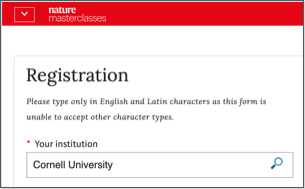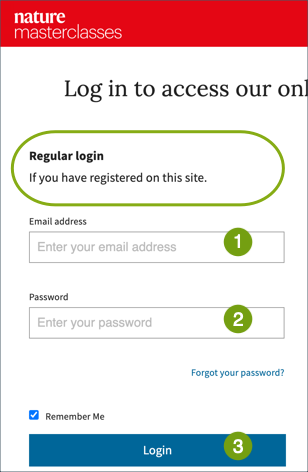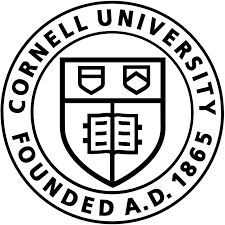Cornell provides a subscription to Nature Masterclasses. All students, faculty, and staff can take any courses available through Nature Masterclasses.

Make the most of this professional development opportunity!
Available Courses
- New! Creating Successful Research Posters
- New! Effective Science Communication
- Getting an Academic Research Position
- Scientific Writing and Publishing
- Finding Funding Opportunities
- Persuasive Grant Writing
- Interpreting Scientific Results
- Data Analysis: Planning and Preparing
- Data Analysis: Conducting and Troubleshooting
- Advancing your Scientific Presentations
- Networking for Researchers
- Effective Collaboration for Researchers
- Managing Research Data to Unlock its Full Potential
- Narrative Tools for Researchers
- Experiments from Idea to Design
- Bonus free course: Focus on Peer Review
Go right to the Nature Masterclasses site OR see course descriptions below.
Register your Account
- Go to https://masterclasses.nature.com/register.
- In the Institution list, select Cornell University.

- Enter your Cornell email address. Note: You must register with your Cornell email so that Nature will recognize your access to Cornell's subscription.
- Choose a safe password, complete the rest of the fields, and then click Register.
- A confirmation email is sent to your Cornell email address. Once your account is confirmed, you can begin taking classes.
Take Classes
After you register your account, you can take classes at any time.
- Go to https://masterclasses.nature.com/.
- Click Login in the upper-right.

- Complete the Regular Login fields and then click Login.

If you need assistance, check the Help page on the Nature Masterclasses website for FAQs and contact details for the Masterclasses support teams.
Course Descriptions
New! Creating Successful Research Posters
- How to craft great engaging research posters and prepare a handout and conversation that will captivate your audience.
- For researchers in the natural sciences who would like to learn how to create and present an effective research poster
- 10–35-minute lessons
What's in the course?
Module 1: Creating Successful Research Posters
- Set communication goals for your poster presentations
- Identify your audience and select your key message and supporting material
- Select the visual elements and supporting text for your poster
- Design a poster that will communicate your key message effectively
- Use your poster to spark great conversations about your research.
New! Effective Science Communication
- How to effectively communicate research with non-experts
- For anyone, including researchers in the natural sciences who would like to communicate their research to a broader audience
- 10-30 minute lessons
- Taught by 8 experts in science communication, science writing and editing, science outreach, engagement and presentations, and the Springer Nature press office
- Receive a certificate when you complete the module
What's in the course?
- Module 1: Effective Science Communication
Getting an Academic Research Position
- How to get an academic research position that suits you perfectly
- For researchers in the natural sciences seeking to take their next career step, either as a new postdoc or in a new faculty role
- 10-30 minutes lessons
- Taught by 11 experts in research career development, including experienced academic researchers, Nature Portfolio journal Editors, and coaching and careers specialists
- Receive a certificate when you complete each part of the course
What's in the course?
- Module 1: Exploring your values, interests, skills and career goals
- Module 2: Finding a research position
- Module 3: Applying for a research position
- Module 4: Excelling at the interview
Scientific Writing and Publishing
- Offers guidance on how to write and publish a great research paper
- For researchers in the natural sciences who want to get published
- Short 10 minute lessons
- Taught by Nature Research journal editors – so you hear tips from the experts
- Receive a certificate when you complete each part of the course
What’s in the course?
- Part 1: Writing a research paper: How to write clearly, write a great title and abstract, and structure your paper — as well as how to manage and present your data
- Part 2: Publishing a research paper: How to select a journal for publication, submit your article, and navigate the editorial process — including how to write cover letters, the peer review process, and editorial decisions
- Part 3: Writing and publishing a review paper: What makes a great review paper, how to plan and write a review, and how to referee a review paper
Finding Funding Opportunities
- For researchers in the natural sciences who want to find funding opportunities or mentor others through the process
- Short 10-30 minute lessons
- Taught by 5 experts in obtaining research funding including a former program director at a major funder, experienced researchers, and a research management consultant
- Receive a certificate when you complete this 1 module course
What’s in the course?
Module 1: Finding Funding Opportunities
- Understand the funding landscape and the importance of finding the best-fitting opportunities
- Identify your funding requirements taking into consideration your personal and professional circumstances
- Search for and keep track of suitable funding opportunities
- Select the most appropriate funding opportunities based on your needs
Persuasive Grant Writing
- For researchers in the natural sciences who want to use narrative tools to improve the quality of their grant applications to make them more informative and persuasive
- Short 15-minute lessons
- Taught by 9 experts in grant writing including researchers, program officers from funding bodies and the Chief Editor of the Nature Research Editing Service
- Receive a certificate when you complete the 3-module course
What’s in the course?
- Module 1: Before starting your grant application: How narrative tools can improve the overall quality of your grant application
- Module 2: Targeting your audience: How to align your grant application with the requirements and objectives of its audience - your chosen funder
- Module 3: Creating a narrative: Learn to apply narrative tools when writing your grant application to make it more informative and persuasive
Interpreting Scientific Results
- For researchers in the natural sciences who want to interpret their scientific findings with more confidence, or mentor others through the process
- Short 10-20 minute lessons
- Taught by 5 experts in interpreting results, including a Nature Portfolio journal Editor and experienced researchers, statisticians and data scientists
- Receive a certificate when you complete this 1 module course
What’s in the course?
Module 1: Interpreting Scientific Results
- Select appropriate approaches to visualize and prioritize your findings in order to identify the key message
- Identify the ways in which your data interpretation helps you to address and answer your scientific question
- Add context to your findings by considering the wider research field
- Summarize and communicate your findings with a focus on your key message, and how to best express caveats and future directions
Data Analysis: Planning and Preparing
- For researchers in the natural sciences who want to develop their data analysis skills or mentor others through the process
- Short 20-minute lessons
- Taught by 10 experts in data analysis including experienced statisticians and data scientists, journal editors and early career researchers
- Receive a certificate when you complete the 2-module course
What’s in the course?
- Module 1: Introduction to data analysis and the importance of planning: How to create a data analysis plan and get feedback
- Module 2: Preparing your data for analysis: How to apply best practice to collate and merge the data you’ve collected
Data Analysis: Conducting and Troubleshooting
- For researchers in the natural sciences who want to develop their data analysis skills or mentor others through the process
- Short 10-20 minute lessons
- Taught by 10 experts in data analysis including experienced statisticians and data scientists, journal editors and early career researchers
- Receive a certificate when you complete the 3-module course
What’s in the course?
- Module 1: Introduction to Data Analysis: Understand the importance of conducting effective data analysis
- Module 2: Exploring Your Data and Reviewing Your Analysis Plan: Identify the range of analytic methods available and understand which is most suited to your data
- Module 3: Analyzing Your Data: Learn strategies for obtaining feedback, troubleshooting and expressing the limitations of your analysis
Advancing Your Scientific Presentations
- For researchers in the natural sciences who want to improve the quality of their peer-to-peer scientific presentations with both virtual and face-to-face audiences
- Short 15-minute lessons
- Taught by 10 experts in scientific presentations including researchers and professionals such as the Editor in Chief of Nature who excel at presenting their work, renowned presentation designers & trainers and experts in narrative tools
- Receive a certificate when you complete the 4-module course
What’s in the course?
- Module 1: Overcoming your research presentation challenges: Identify techniques that can help to overcome the challenges that researchers commonly face when creating and delivering oral presentations
- Module 2: Developing the story behind your talk: Build compelling research stories to use as the foundation for your presentations
- Module 3: Building an engaging slide deck: Create professional slide decks that effectively communicate your research findings to your audience
- Module 4: Preparing and navigating your talk: Apply strategies to help you deliver your presentation effectively on the day, in both virtual and face-to-face environments
Networking for Researchers
- For researchers in the natural sciences to identify and use career and research goals to develop their networking strategy, and acquire key skills to build and maintain a professional network in person and online to advance their research and their career
- Short 15-minute lessons
- Taught by 10 experts in networking including researchers, experienced academic networkers, fellows, networking consultants and communications specialists
- Receive a certificate when you complete the 4-module course
What’s in the course?
- Module 1: Why network?: How to examine the different purposes, challenges and opportunities related to building your network
- Module 2: Getting ready to work: How to prepare key resources to help you build an effective network
- Module 3: Connect with new networking contacts: Strategies to approach and connect with potential network contacts, both in-person and online
- Module 4: Nurturing and harnessing the power of your network: How to follow up on initial approaches and how to apply strategies to leverage your network that will advance your research or career
Effective Collaboration in Research
- Offers guidance on how to join in, set up or lead collaborative projects
- For researchers in the natural sciences who want to make the most out of collaborative research projects
- Easy-to-use with short 15 minute lessons
- Taught by experts in collaboration including researchers, funders, editors and professionals
- Receive a certificate when you complete each part of the course
What’s in the course?
- Part 1: Introducing collaboration: Why collaborative research is becoming more prevalent
- Part 2: Participating in a collaboration: The pros and cons of collaborating
- Part 3: Leading a collaboration: How collaborative projects can help advance your research and career
Managing Research Data to Unlock its Full Potential
- Offers guidance on how to develop one’s data management skills or mentor others through the process
- For researchers in the natural sciences who want to learn about acquiring practical lifelong skills to manage their data efficiently and comply with evolving requirements, including from funders
- Short 15-minute lessons
- Taught by experts in data management, including researchers, funders, data publishing and institutional data management specialists
- Receive a certificate when you complete the 4-module course
What’s in the course?
- Module 1: Welcome and introduction: Why effective data management is beneficial to your research and your career
- Module 2: Creating and maintaining your data management plans: How to create and maintain a data management plan
- Module 3: Managing data in the short and long term: How to apply best practices for organizing, storing, archiving and quality checking your data
- Module 4: Sharing your data: How to ensure that your data is understandable to yourself and others
Narrative Tools for Researchers
- Offers guidance on how to enhance your communication to your peers by using narrative tools to tell your research story
- For researchers in the natural sciences who want to learn about how to communicate their research to the scientific community in an effective, compelling and memorable way
- Easy-to-use with short 15-minute lessons
- Taught by 10 experts in using narrative techniques in scientific communication, including researchers, Nature editors and science journalists
- Receive a certificate when you complete the 3-module course
What’s in the course?
- Module 1: Why use a story?: The benefits of using a compelling story to communicate your research to your peers and stakeholders, such as funders or industry partners
- Module 2: Building your story: How to build and combine different narrative elements that can help you create a more compelling scientific story
- Module 3: Refining your story: How to refine your story by soliciting feedback and implementing edits
Experiments: From Idea to Design
- Equips you with the right tools to help develop, plan, and refine robust, impactful experiments
- For researchers in the natural sciences who want to develop their experimental design skills
- Easy-to-use with short 15-minute lessons
- Taught by 9 experts in experts in experimental design including experienced researchers and Nature Portfolio Journal Editors
- Receive a certificate when you complete the 4-module course
What’s in the course?
- Module 1: Foundations of Experimental Design: The benefits of honing your experimental design skills before embarking on full-scale experiments
- Module 2: Developing your Motivation, Assumptions, and Hypotheses: How to prioritize research motivations according to their potential impact, your skill set, and your enthusiasm; identify your assumptions; formulate hypotheses and testable predictions
- Module 3: Assembling your Experimental Plan: Identify the information that you need to collect to test your assumptions, hypotheses, or predictions, and fulfill your research motivation
- Module 4: Utilizing your Experimental Design: Refining your experimental design before conducting your full experiment



